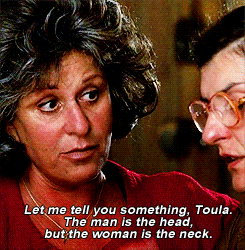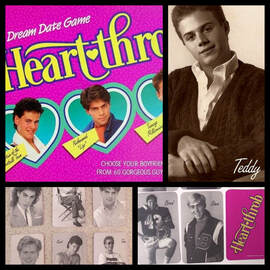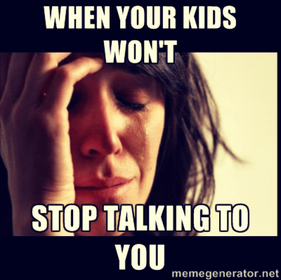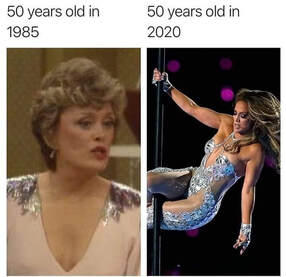 It’s Safe to say Latino culture is male chauvinist oriented and generally revers the machismo persona. There are a lot of factors that come into play. Catholicism which is inherently part of being Latino, proliferates the idea of traditional gender roles as the best way. What does this mean? Women in the home and men at work. But it starts earlier than that. It starts with how we treat our kids and the differences that exist in how we treat boys versus girls. There is a juxtaposition between what culture may dictate and what is really being practiced in the home. For example, I am always reminded of a scene from my big fat Greek wedding where one of the aunts says The man is the head, but the woman is the neck, meaning the woman is the one that navigates which way the head or man is going to move. While Latin culture may adhere to the man as the ruler of the home, it is matriarchal in the sense that the mother figure, usually the grandma is the one that is the most respected in the family and often times consulted on important matters. I hope to become the matriarch in my family. I am thankful that my kids are growing up in an era when the world view is shifting on so many topics specifically those around gender. They will have a world that is much more open to them and I’m looking forward to seeing how they develop as people. They will be able to define themselves as they see fit and hopefully will not be shackled to cultural expectations around gender. In a way and because I am part of two cultures, and grew up straddling both, I grew up in a changing era but also experienced what it is like and what it feels like to be rooted in these traditional gender roles. My big generalization is that in our mother's time there was a stigma associated with not following traditional gender roles. What do gender roles mean to you? What gender stereotypes do you conform to? Which do you challenge? How will you explain gender roles and gender stereotypes to your kids? Would love to hear from you! XO, Wendy
0 Comments
 My mom always said del amor no se vive, one does not live off of love. I always hated when she said that. It sounded so horrible, especially since my idea of romantic love came from the melodramatic Telenovelas I watched in the evenings and the romantic comedies I watched at the movies on the weekend. I always fancied myself one of the heroines, waiting for love to come and sweep me off my feet. And in a way, I was. I waited and waited and waited until I started writing sad poetry about my aging virginity. As a kid I remember going to Toys r Us. This was a pretty big deal in my house because my parents never bought toys. I was allowed to pick something out and I picked out Heartthrob, The Dream Date Game from 1988. It was basically a bunch of centerfold cards or headshots of eligible bachelors, and I’m sure there were rules to the game too, but I never got to play with anyone because I didn’t have friends at that time, and I don’t think I even spoke English, so all I did was look at the cards and pick which boys I liked best solely based on looks. And that is how I would continue to pick boys to like for most of my youth, which is probably why I never had a boyfriend growing up. The “cute” or “cool” boys just weren’t into me. My parents were pretty strict when it came to boys and dating anyway. I wasn’t allowed to go on dates, boys couldn’t call me on the phone, I think? Honestly my parents never said I couldn’t date or have boys call me on the phone, but I assumed as much because anytime any of this came up my parents made me feel ashamed for even thinking about it, or patronized, because how could a child understand the complexities of what a relationship entails? This could of all been something I made up in my head, but there it is. I did not date until college and I did not have a real boyfriend until I was in my 20’s. Valentine's Day has always been a downer, except for my dad. My dad would always be my Valentine. He would bring me a flower or a teddy bear or a balloon, you know, the stuff you can buy from the guy selling them at the stop light. It was cute and thoughtful and my best memories of a contrived holiday that has for the most part just made me feel lonely and unlovable. If he ever brought my mom flowers though she would say, estas se van a morir. Porque no me das el dinero mejor, or “these are going to die why not give me the money instead.” Once he put money in the flowers and she was both happy and insulted. My big generalization is that our ideas and expectations of romantic love will never live up to reality and that this hyped up holiday is not doing anyone any favors, but rather creating more reasons to feel bad about ourselves and our love lives. Have you ever had a good Valentine's? What were your ideas of romantic love before having experienced love? My mother used to say del amor no se vive, one does not live off of love. Did your mom have any of these totally unromantic sayings? Would love to hear from you! XO, Wendy  I love being pregnant. I feel healthy, strong and vibrant. I’m that mom that takes a weekly picture of her bump, publishes it as a pregnancy journal, and then prominently displays it on a shelf in the living room for anyone to look through. I love the changing, ever-growing bump and everything else it ripens with it. It’s getting the kid out of me that is problematic. I’ve had 2 c-sections and right after them, it feels like a death and a birth all at once. The person I was, the body I had inhabited is gone. The baby I hold in my arms and this new body that I share, granted, in a very awkward way, have to be nursed into being. The baby and my body change over the course of the year. Each becoming independent, beautiful, whole again. My moms version of the sex talk was threatening me to not get pregnant or else, or calling me a whore when I came home too late in my very early 20’s and because of this, there were so many things I didn’t know. I read so much about parenting, a little about giving birth, and nothing regarding post birth. My big generalization for this week is that our mothers did not prepare us for any aspect of the birthing process because it was considered indecent and probably gross to speak about anything related to women’s bodies. It’s getting better, but women are still embarrassed to speak to each other candidly about these experiences. What do you wish someone had told you about the postpartum experience? I wish someone would have told me that having a baby was going to make me a better version of me. I’m stronger, more patient, kinder, more efficient, more determined. Do you think motherhood has made you better? Did your mother speak candidly to you about any aspect of the birth experience? Making the baby, housing the baby, birthing the baby, being with the baby? Would love to hear from you! XO, Wendy  Momming while Latina in the American suburbs is a nuanced balance between instinctually parenting based on what I experienced as a kid, and implementing parenting skills I am expected to know based on my mama peer group. And to be honest some days it’s a toss-up rather than a conscious choice. There is a battle between the reactionary angry or dismissive mama I can be based on my upbringing, or I can be a self-aware, patient, kind. It really depends on a couple of factors. How well did I sleep last night and how many glasses of wine/cocktails/beers did I “responsibly” drink with dinner. (I can hear my mother, “Grocera, sin verguenza!”) I mean the way I speak with my children, and not just to my children is weird. I treat them like actual people! Even as babies and could not possibly respond! I know, so progressive of me. It’s like I respect them or something? This, just the amount of talking and sharing and expressing of words and feeling and drawings and colors that represent words that explain feelings. Oh. My. Goodness. Is it any wonder that my 5 year old never shuts up? The modern American mother that I am becoming talks all the time. The traditional Latina mother that I was raised by did not. She gave commands. She gave reprimands. And when I got old enough, was not afraid to give some very traditionally female insults. I’m sure you can guess some. Open and honest communication, building a relationship based on trust and respect, being conscious of what I say to and about others, truly understanding the importance and weight of words, listening; all skills I had to figure out along the way, and definitely not what came naturally when I began my parenting journey. My huge generalization for the week is that Latina mothers from that time did not talk to their kids as much as we talk to our kids now, nor in the same way. How much and how do you talk with your children? Is it similar or different than how your family spoke to you when you were a kid? Was healthy communication an emphasis in your home or was it not existent? What factors contributed to this? Would love to hear from you! XO, Wendy  When you think of a mom, what images come to mind? When you think of a mom, do you ever think of her as her own person? I think we tend to forget that moms were once girls and then women with their own lives and goals and feelings. I often explain to my five year old that I am not just his mother or his little sister's mother, or his father’s wife, but also my own person. Yes I take care of everyone but I also include myself. I take care of myself. I am a mother and while that identity does encompass every aspect of my life and my personality, it is not all of me. Even if I am in full mom mode, I still feel like myself. There is a self-assuredness that this moment I am living is chosen and fleeting and so I enjoy it. I know that inherently I am still sexy, I am still pursuing my goals, I am a complete person exercising her full self. This is hard, takes constant reminders and is not overtly obvious. You will not see me with my kids at the park and think there goes a sexy fulfilled woman. No, you probably won’t even notice me. But that’s not the point. It’s not for the passers-by. Feeling good is for me. Feeling like a mamacita comes from within. My huge generalization for this first episode is that in our mom’s era, in the countries in which they grew up or became mother’s in, the identity of being a mom thwarted any other identity they may have had. Mothers were not seen as whole human beings. They were just seen as moms. They could be working moms, but Mom with a capital M took over everything. This is a podcast about starting conversations. So please, what is a mamcita? What makes you feel like a mamacita? Do you feel pressure to be one way or the other, either the sacrificed mother or the mom who can do it and have it all? Are either of these roles even attainable or realistic? Would love to hear from you! XO, Wendy |
AuthorWendy writes blog posts that turn into conversations for the Mamá Cita Podcast. Archives
May 2021
Categories
All
|
 RSS Feed
RSS Feed
